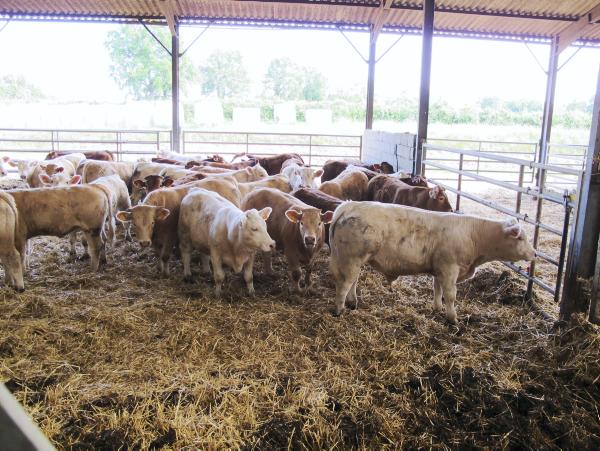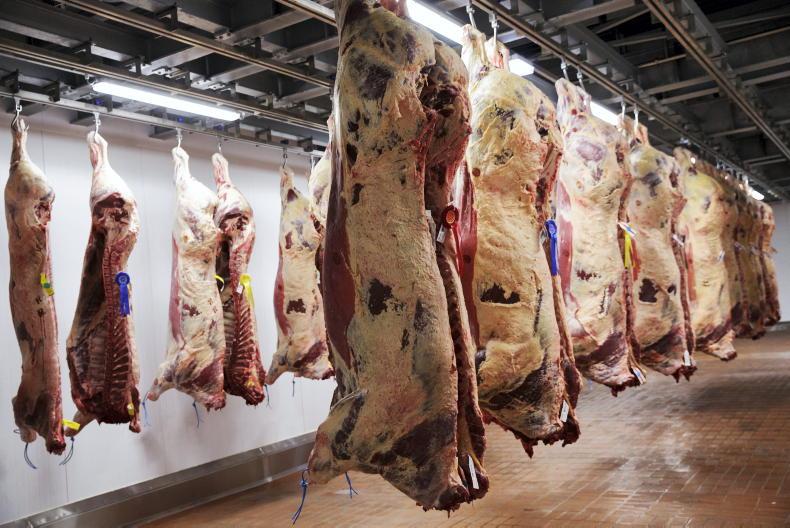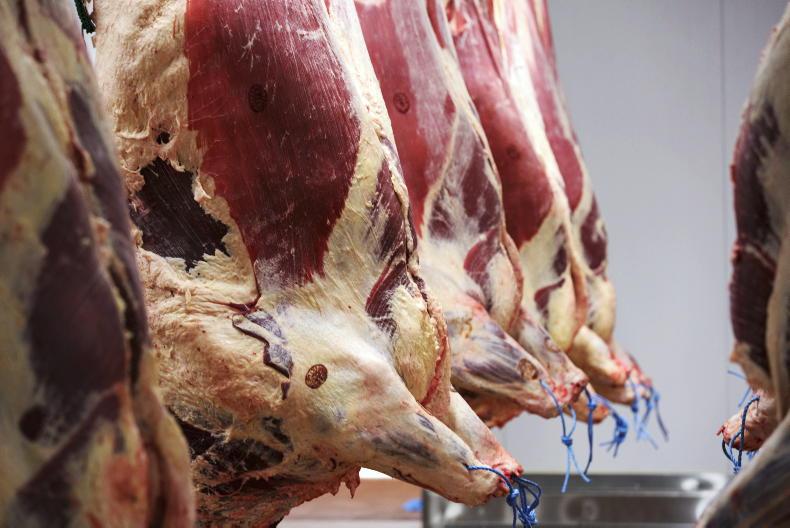Infectious Bovine Rhinotracheitis (IBR) infection is common with an estimated 70% of Irish cattle having been exposed to the herpesvirus behind the condition. All age groups can be affected, with recent research showing IBR infection as a frequent finding in respiratory disease in young Irish calves. When an animal meets IBR virus for the first time, symptoms range from none visible to very severe (fatal) – all depending on factors such as the amount and strain of virus, the general health of the animal, other viruses and bacteria also present and farm management.
IBR is an unusual infection in that all exposed animals become permanent carriers (the herpesvirus lodges in the animals nervous system) and they will occasionally shed virus thereby infecting any nearby susceptible animals and starting the whole cycle all over again. IBR carrier animals can appear externally healthy and farmers are often surprised to find the extent which IBR has spread throughout their herd. Almost all animals which are exposed to IBR virus develop strong antibodies which then can be used to identify which animals are likely to have been exposed (therefore permanent carriers) from unexposed animals without any antibodies. There is no cure or treatment once an animal has become an IBR carrier.
IBR is a disease of change. The types of change that trigger IBR can be due to mixing of cattle, calving, weaning, movement, peak lactation or inclement weather. Anything which cattle might find stressful can cause an IBR permanent carrier to start shedding virus, and in doing so light the fuse for a possible disease outbreak but at a minimum leading to the infection being passed on. Indeed infection with BVD is known to be an excellent trigger to start carriers reshedding virus. Progressive farm management and good husbandry can go a long way to restricting the impact of IBR within a herd.
An IBR carrier animal differs from a BVD persistently infected (PI) animal in two major ways. PIs are born infected at birth whereas IBR can be acquired at any stage during life. Secondly PIs shed vast quantities of BVD virus pretty much constantly while IBR carriers tend to shed only after periods of stress.
Recognition
The most common clinical sign of IBR infection is no sign at all! Most animals develop temperatures but at the lower end of the scale, a depressed feed intake and sudden drop in milk production for a few days may be all that is seen. If enough negative factors are in place, much more serious clinical signs can develop such as rapid and loud breathing; coughing; discharges from eyes and nose; reddening of the nose; and very ill animals. As most of the damage involves the windpipe, badly affected animals cannot get enough air into their lungs and they adopt an air- hungry stance. Things can snowball quickly, with many animals succumbing to the disease, which can be rapidly fatal. However, even those animals which do survive often have extensive amounts of residual lung damage and permanently underperform (poor doers or respiratory cripples). As well as the lungs, IBR can target the animals’ reproductive organs and has been linked to abortion and can be shed into semen (the threat of this is a major headache for all AI stations).
The animals which are most vulnerable to IBR infection are those with no previous exposure to the virus. In herds which already have IBR these would be newly bought-in animals; replacements moving into the main herd; younger animals in their first season mixing with older animals. In herds which don’t already have IBR, the major risk is that IBR could be unknowingly introduced with bought-ins, break-ins or those brought back from contract rearing, shows, marts. The rest of the herd is what’s at risk of infection and disease in this case.
Diagnosis
In the middle of a full-blown disease outbreak, IBR can be diagnosed directly based clinical signs, nasal sampling for the virus itself (lab testing called PCR is extremely sensitive and is now available in Ireland) and post-mortem findings.
As most IBR in Ireland is spread silently without clinical signs, the fact that you haven’t experienced a dramatic outbreak of the nature described above could mean of two things:
1. IBR is circulating quietly in the background.
2. Your herd is free or almost free of IBR.
These two opposing situations can look identical at farm level but in IBR terms are completely different. In order to make an informed decision on what to do, it make sense to assess the herd’s IBR status (until this is done, as the virus is so widespread, its safer to assume it is present).
Establishing the level of infection in a herd involves blood sampling a number of animals and extrapolating the likely herd percentage based on those showing previous IBR exposure. Dairy farmers have the additional option of using bulk milk testing to help assess infection rate among the dairy cows. Effectively this type of sampling is a type of poll and needless to say sampling more animals increases the accuracy – detailed sampling strategies are available on the Animal Health Ireland website. For an increasing number of farmers who are breeding animals with higher genetic value or trying to access IBR-restricted markets, where the situation regarding IBR can dictate the success of the whole business, specific groups or perhaps the whole herd may need to be sampled.
All IBR vaccines bought in Ireland are of the marker type. This is extremely useful as it allows animals which have antibody due to vaccination to be distinguished from animals which have antibody due to natural infection. The two main tests used for IBR antibody testing are called gB and gE ELISA– Table 1 illustrates how to interpret them.
In this type of sampling, always try to take the samples when groups of animals have been assembled for at least 14 days. Remember, sampling calves less than three months old merely shows the amount of IBR antibody they got in the colostrum.
Control
Your vet will work with you to establish your herd’s likely IBR status, based on sample results, herd history and the herd profile. Broadly, there are three different results that can be arrived at:
Negative or near-negative – this is relatively uncommon and something worth defending. However, the herd can only be considered truly IBR negative when all the breeding herd are individually blood sampled and test negative. IBR freedom should be considered as an asset, worthy of protection and investment so the emphasis will be on enhancing biosecurity, screening all purchases, possibly with vaccination. With a little bit of effort, IBR should remain excluded and so will not complicate future breeding or selling decisions.
Low positive – One option here is to make the final push and remove the likely low number of IBR positive animals which will give you then effectively a negative or near-negative herd from IBR. All the breeding herd needs to be individually blood sampled and those which test positive identified for culling.
Medium/high positive – It probably has to be accepted that a significant proportion of the herd are probably infected. IBR freedom is currently not really feasible at this stage. The aim should be to breed/vaccinate the herd away from IBR over a couple of seasons then re-evaluate the herd’s status. The vaccines available for IBR are effective and if used correctly will ensure that progress is made against the virus. At that later stage, the option to test and cull becomes realistic.
All of the above make the assumption that making progress against IBR is a high enough priority to make the investment and effort worthwhile. But even when tackling IBR may not be on the to-do list this year, it can make sense to bank away the herd’s IBR status in 2014 for future reference. And if the herd is known to contain IBR, reappraisal of management activities to reduce stress will pay dividends.
Imagine a dairy farmer with 100 high-yield cows who doesn’t vaccinate for IBR gets his vet to send 10 blood samples for gB and gE. He gets his results back and eight are negative for gB and gE antibodies. Two consecutive bulk milk results also indicate very low levels of infection.
One animal, a bought-in, is gB positive and gE negative which means she was vaccinated before she came. Another animal, an old home-bred cow, is gB positive and gE positive, which means she was exposed and is likely to be a carrier animal.
This farmer has options. He can establish his herd’s IBR status by bleeding individually – he’s unlikely to find many IBR positives and those he does find can be marked out for special consideration when reviewing which animals to put back in calf. He can therefore quickly move to a herd with a negative IBR status.
Summary
The primary driver for IBR control in Ireland will be trade. As Ireland evolves to have one of the most intensely managed and advantaged breeding programmes in Europe, live animal exports and semen/embryo sales are likely to hit trade barriers due to IBR restrictions in other regions. In Europe, enough countries are making the effort to eradicate IBR that this is becoming a probability rather than a possibility.
Even locally, IBR continues to be the major infectious disease factor keeping the best Irish genetics out of AI stations and the risk of an IBR outbreak continues to overhang all AI station activities.
In 2014, herd freedom from IBR is not for everyone but lowering the impact of the virus at herd level removes one more level of uncertainty making progress against IBR both very attainable and desirable ambition for most Irish herds.











SHARING OPTIONS